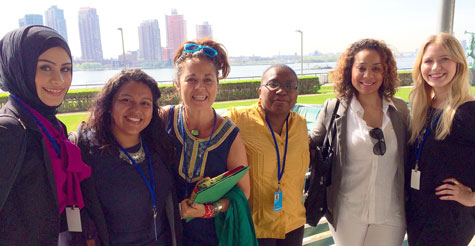Newsroom Archive

John Jay College students, faculty and alumni representing the Historical Memory Project (HMP) are attending the Thirteenth Session of the United Nations Permanent Forum on Indigenous Issues (UNPFII) from May 12-23. The UNPFII is an advisory body to the Economic and Social Council (ECOSOC), with a mandate to discuss indigenous issues related to economic and social development, culture, the environment, education, health and human rights. Participants advocate for justice and for the rights of indigenous families, communities and nations around the world. Representatives and ancestral authorities gather at this unique annual event in New York City.
The Historical Memory Project, in collaboration with the John Jay College Center for the Advancement of Teaching (CAT), leads the John Jay delegation with aim of carrying out critical ethnographic research to learn about human rights violations against indigenous peoples worldwide. During the spring 2015 semester, HMP will sponsor a hybrid interdisciplinary course/internship led by Professor Marcia Esparza of the Department of Criminal Justice in collaboration with the International Criminal Justice undergraduate program.
For further information about the United Nations' Permanent Forum visit http://undesadspd.org/IndigenousPeoples.aspx
The Historical Memory Project is a learning resource that documents and advocates for truth, historical memory, justice and public access to state violence, war and genocide archives in Latin America. Researchers with the HMP collect and digitally disseminate evidence, artifacts and materials from the Cold War years with special attention given to mass atrocities committed against indigenous peoples. The public is invited to bear witness not only to state violence, war and genocide, but also to heroic struggles of resistance against historical injustices.
Esparza is the Founder and Director of the Historical Memory Project. She launched the Project in 2002 to to preserve the collective memory of war and to promote critical awareness of long-term consequences of state violence and genocide in Latin America. Esparza’s field research includes interviewing war survivors as part of the United Nations’ Historical Clarification Commission in Guatemala (1997-1999), and later, with pro-army groups in the country’s highlands. Her post-doctoral research includes locating and examining Cold War human rights court files in Chile. She has co-edited State Violence and Genocide in Latin America: The Cold War Years (Routledge, 2009), with Daniel Feierstein, published in leading academic journals like the Journal of Genocide Research. Marcia has also received prestigious fellowships from the Ford Foundation (2010-2011), and the National Endowment for the Humanities, NEH (2011-2012). Currently, she is completing her second book, Silenced Communities: Legacies and Resistance to Militarization in Postwar Santo Tomas Chichicastenango, El Quiché, Guatemala (1997-2004).
Learn more at the Historical Memory Project at www.historicalmemoryproject.com and follow them on Twitter @HMPNYC and Facebook.
 Inside JJC (Faculty & Staff)
Inside JJC (Faculty & Staff) Technology Services Status
Technology Services Status

